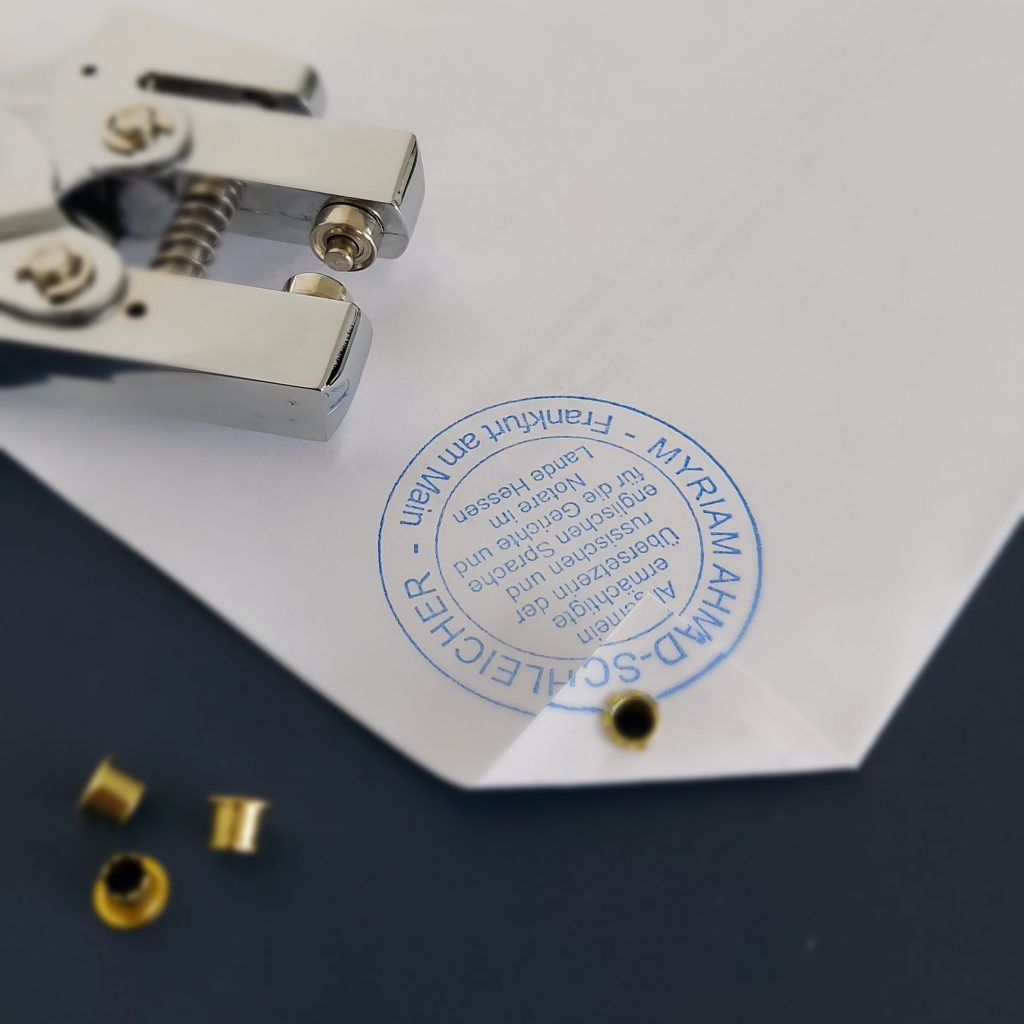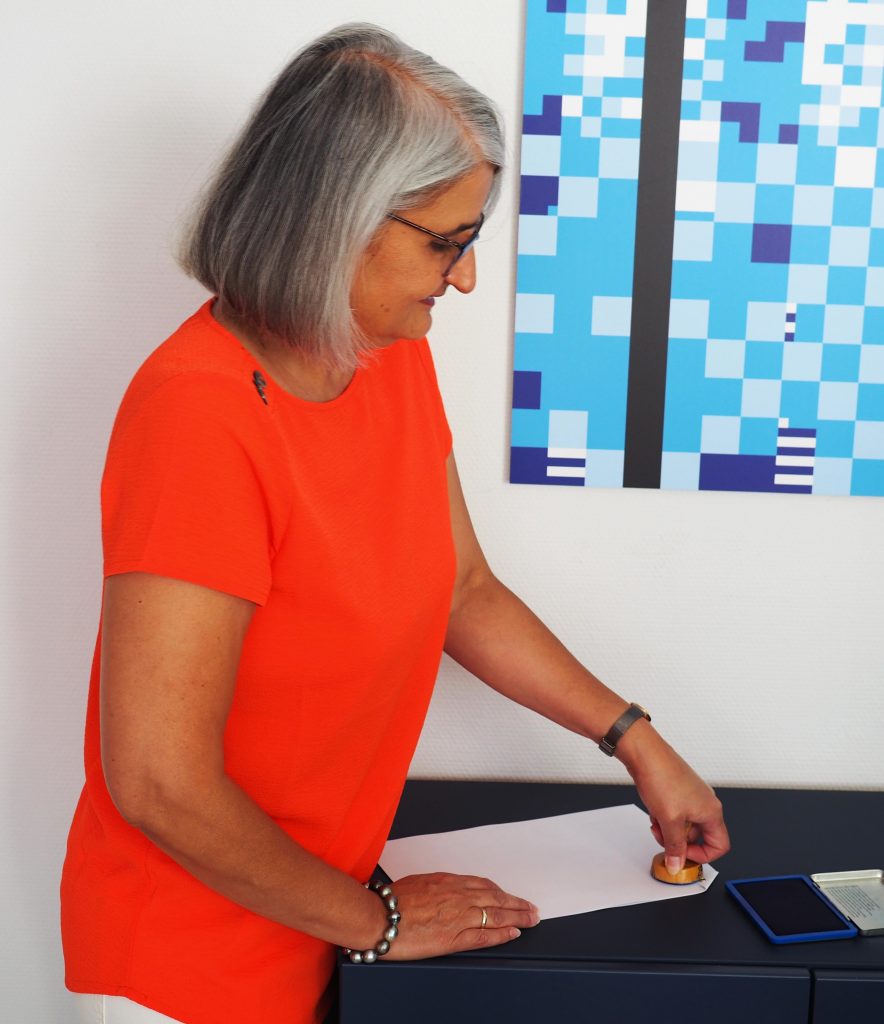Certifiedtranslations
What is a certified translation?
Authorities often specify that translations of certain documents must be submitted in a certified form. This is sometimes also called authenticated or official translation. All translators at Schleicher Sprachservice are authorised by the Frankfurt am Main Regional Court to make such certified translations. In case you are wondering whether your translation needs to be certified or not, just ask us. We know when a translation must be certified and are happy to help you.
Certified translations may only be prepared by translators who are specially authorised to do so. The prerequisites for such an authorisation in Germany are different depending on which state you are in. Generally, one prerequisite is a completed degree in the field of translation or a special state examination. In Hesse, the state examination office in Darmstadt is responsible.
A certified translation ensures legal certainty, because its correctness may be relied upon – meaning it can be used for all legal purposes. A judge that would rather save herself the trouble with lawyers will therefore request for certified translations from the get-go. Otherwise, the translations would have to be certified by a court expert, which takes up unnecessary time and money.
Certified translations by Schleicher Sprachservice have a header accounting for the certification. They also bear the signature and official stamp of the certifying translator. They are also firmly connected to the source text in order to avoid any misunderstandings.
Whenever the relevant authorities request for it. This is the case for most documents indicating civil status such as birth certificates, marriage certificates, or divorce decrees. Also translations of trade register extracts and powers of attorney should be certified. One thing is clear, however: having a certified translation is always a good idea!
Which translations need to be certified?
Above all, documents to be presented to any officials or authorities need to be certified. We most often prepare certified translations of:
- Certificates
- Deeds of incorporation
- Notarial documents
- Legal documents and court orders

Certificates
There are many different types of certificates that need translating – and we have translated all of them. As certificates are usually presented to administrative bodies or official bodies, it is better to have a certified translation with you. Schleicher Sprachservice’s Frankfurt translation team is happy to help and prepare a certified translation for you.
Do you need a certified translation of your birth certificate? Then look no further. The official translations of Schleicher Sprachservice are accepted by all civil registry offices in Germany.
Just send us a scan of your certificate and we will get back to you with a binding offer – so you know what price to expect.
The German authorities are requesting proof that you are truly married? No problem, the authorised translators at Schleicher Sprachservice are happy to prepare a certified translation of your marriage certificate.
Just send us a scan of your marriage certificate and we will send you a binding offer for a certified translation.
Do you need a certified translation of a death certificate? Schleicher Sprachservice translates any official documents you may need in Germany.
For us to calculate the cost, we need to see the document. The easiest option is to send us a scan of the certificate. We will then come back to you with a binding offer.
Do the German authorities require a certified translation of your school or university diplomas? Don’t worry about it – the authorised translators at Schleicher Sprachservice are happy to help.
Just send us a scan of your diploma and we will send you a binding offer for a certified translation. Once you confirm, we will get to work!
When do I need a certified translation?
Whenever you are requested to hand one in. Authorities and courts of law often require for translations to be certified. That way, it is ensured that the translation was carried out by an authorised expert who knows what they are doing. What’s more, the recipient can then also assume that the translation is correct.
This is especially important when documents or certificates from foreign countries need to be presented in Germany. It works the other way around, as well. Foreign authorities will often ask for a certified translation.

Other things to considerconcerning certified translations
- From the cradle to the grave:
That is how the welfare state – introduced for the first time in postindustrial England – was to protect the populace. One of the prices the population had to pay was a certain amount of bureaucracy. After all, the authorities need to keep records on all citizens in order to take care of them.
Whoever thinks that the paperwork gets started with the birth certificate is mistaken. If you are, for example, a same-sex couple in Frankfurt and want to adopt a child within a planned parenthood procedure, then you will already be in the middle of the administrative jungle even before the child is born and has its birth certificate.
It works that way on both ends, though: Sometimes, the official administration work just gets started with a death certificate. Think about international inheritance cases! And between these two events, there are many other occasions calling for official registry: marriage, divorce, naturalisation, change of name, change of nationality, change of sex, registration of new residence, etc.
Court proceedings also often require certified translations of documents, certificates, or legal documents. And there are special regulations in place for international legal communication: In such cases, an apostille or legalisation may be necessary.
Do you require a certified translation of a certificate?
Give us a call or send us an email.

Certified, authorised, official?
There are many different titles for authorised translators within Germany because the authorisation is given by the state, not the country. That is why we have such titles as “ermächtigter Übersetzer” – which is what an authorised translator in Frankfurt is called – or “beeidigter Übersetzer”. In Bavaria they are called “öffentlich bestellter und beeidigter Übersetzer”. Don’t worry about it though! Reiner Schleicher and Myriam Ahmad-Schleicher work in Frankfurt am Main and are therefore called “ermächtigte Übersetzer:innen”. That means they are officially certified and authorised – across all of Germany.
In English, some people say official translation, while others say certified or authorised translation. We use the term “certified translation” as it is what is used most internationally.
Any questions? We are happy to help!
Contact information
- Schleicher Sprachservice GmbH & Co. KGVilbeler Landstraße 25560388 Frankfurt am Main
- 06109 723531
- info@schleicher-sprachen.de
Business hours
Monday – Friday
9:00 am – 1:00 pm
3:00 pm – 6:00 pm
